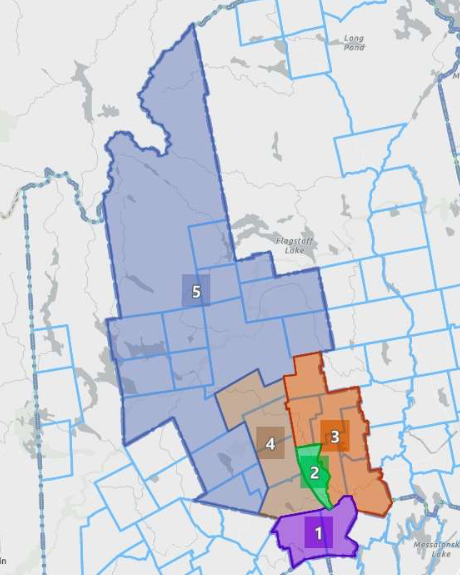
FARMINGTON — A bill to increase the number of Franklin County Commissioners from three to five has been introduced to the House of Representatives by Scott Landry of Farmington. This bill will be put to the voters of Franklin County in November, and was presented to the Farmington Board of Selectmen Tuesday night by Senator Russell Black.
Effectively, the county will be redistricted regardless of the success or failure of the bill.
Based on population, the proposed plan states that if the county maintains three districts, District One would consist of Carthage, Dallas Plantation, Jay, Rangeley Plantation, Sandy River Plantation, Wilton, and the unorganized territories of South Franklin and West Central Franklin. Currently, District One consists of Carthage, Jay, Temple, Wilton, and South Franklin.
District Two would represent Chesterville, Farmington, and Temple. Currently, District Two contains Chesterville, Farmington, and New Sharon.
District Three would represent the rest of the county: Avon, Carrabassett Valley, Coplin Plantation, Eustis, Industry, Kingfield, New Sharon, New Vineyard, Rangeley, Phillips, Strong, and the unorganized territories of East Central Franklin, Wyman Township, and North Franklin. Currently, District Three is made up of Avon, Carrabassett Valley, Coplin Plantation, Dallas Plantation, Eustis, Industry, Kingfield, New Vineyard, Phillips, Rangeley, Rangeley Plantation, Sandy River Plantation, Strong, Weld, and the unorganized territories of Wyman Township, North Franklin, East Central Franklin, and West Central Franklin.
If the county shifts to a five-district model, the districts would be designated in the following manner:
District One: Chesterville and Jay.
District Two: Farmington
District Three: Farmington, Industry, New Sharon, New Vineyard, Strong, and the unorganized territory of Freeman Township (in East Central Franklin.)
District Four: Avon, Phillips, Temple, Wilton
District Five: Carrabassett Valley, Carthage, Coplin Plantation, Dallas Plantation, Eustis, Kingfield, Rangeley, Rangeley Plantation, Sandy River Plantation, Weld, and the unorganized territories of East Central Franklin, North Franklin, South Franklin, West Central Franklin, and Wyman Township.
Each district would represent approximately 6,000 people.
Farmington’s population density would require that the town be split into two separate county districts. That line is not fixed at this point in time. Being split would potentially allow Farmington to have two votes on the board of commissioners, but could also mean that residents of one part of Farmington would represented at the county level by someone who did not live in Farmington.
Representative Scott Landry, who sits on the Farmington Board of Selectmen, sponsored the bill. He said that he felt it would be better for the county and better for the town of Farmington.
Efforts have been made to increase the number of county commissioners from three to five in recent years, including another bill through the state legislature. That bill included language that allowed the county commissioners to veto the change without putting it to the county residents, which the Franklin County commissioners chose to do.
Many municipal boards are made of five or more members, including most county commissioners boards within the state of Maine.
With a three-member board, one member may not stop to speak with another member in the street without potentially being in violation of rules surrounding municipal meetings, because two members makes up a majority of the board.
Senator Black said that the only real opposition he has heard with regards to this bill was the cost to the county; he felt that the change could be arranged with no additional cost to the county taxpayers as the Secretary of State will print the ballots for the vote in November. In addition, the county commissioners set their own salaries, allowing them to divide the $36,000 currently budgeted into five seats rather than three should they choose to do so.
Black said that many people in the northern part of the county have been advocating for this change to allow better representation, but that he has heard support from towns in southern Franklin County as well.
Farmington selectboard members were generally in favor of five districts and had been for some time, feeling that it provided a better governing system and allowed for a more balanced board, but the proposal to split Farmington into two separate districts gave them pause.
“If we have a healthier county, we can’t help but be a better community,” Chairman Matthew Smith said.
The select board did not vote on a statement in support of the change or opposed to the change, wanting more time to think it over, discuss it, hear concerns from their constituents, and make an informed opinion on the matter.




